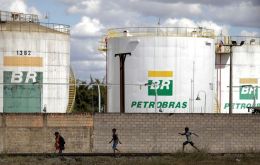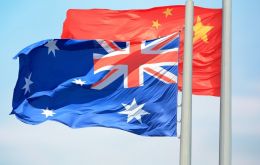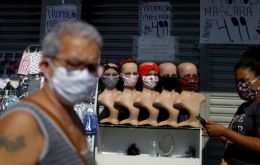MercoPress. South Atlantic News Agency
Economy
-
Tuesday, May 19th 2020 - 08:53 UTC
WHO admits an independent probe into the coronavirus management; China pledges US$ 2 Billion

The World Health Organization bowed to calls on Monday from most of its member states to launch an independent probe into how it managed the international response to the coronavirus, which has been clouded by finger-pointing between the U.S. and China over a pandemic that has killed over 300,000 people and leveled the global economy.
-
Tuesday, May 19th 2020 - 08:47 UTC
Latin American stocks and currencies rise on hopes of global economic recovery

Latin American stocks and currencies roared higher on Monday, with Brazil shares rising 3.5% as commodity prices surged on hopes of economic recovery as countries eased pandemic-induced lockdowns.
-
Tuesday, May 19th 2020 - 08:42 UTC
LATAM Chile, Colombia, Ecuador, Peru to lay off 1,400 workers

LATAM Airlines Group, the largest airline conglomerate in Latin America, announced it will lay off 1,400 workers from its branches in Chile, Colombia, Ecuador, and Peru. The news was confirmed by the company on May 15, after Reuters released an internal video where LATAM CEO Roberto Alvo announced the measures to its employees.
-
Tuesday, May 19th 2020 - 08:03 UTC
France and Germany confirm alliance and propose 500 bn Euro recovery fund for Europe

France and Germany proposed on Monday a 500-billion-euro (US$545-billion) fund to finance the recovery of the European Union's economy from the devastation wrought by the coronavirus crisis.
-
Tuesday, May 19th 2020 - 08:02 UTC
China slaps 80% tariff on Australian barley alleging subsidies and dumping

Australia is “disappointed” China has imposed massive tariffs on its barley and will consider taking the dispute to the World Trade Organization, the country's agriculture minister said on Tuesday.
-
Tuesday, May 19th 2020 - 07:58 UTC
Brazilian agribusiness exports to China booming

In the first four months of this year, Brazilian agribusiness exports totaled US$31.40 billion, marking a 5.9% increase year-on-year. The growth of agribusiness exports resulted in an increase in volumes 11.1%, while the index price suffered a drop of 4.7%.
-
Monday, May 18th 2020 - 08:15 UTC
Fed chief forecasts US economy could easily contract 20 to 30% this quarter

The business shutdowns caused by the coronavirus pandemic could “easily” cause the US economy to collapse by 20 to 30% this quarter, Federal Reserve Chair Jerome Powell said on Sunday. Data show more than 30 million jobs were destroyed in the world's top economy, as businesses were shuttered nationwide amid the efforts to stop the spread of COVID-19.
-
Monday, May 18th 2020 - 06:52 UTC
Virus makes UK super-rich US$ 65 billion poorer and alters Super Rich List 2020

Britain's wealthiest people have lost tens of billions of pounds in the coronavirus pandemic as their combined annual wealth fell for the first time in a decade, the Sunday Times reported in its Rich List 2020.
-
Saturday, May 16th 2020 - 07:57 UTC
IMF calls on digital companies' responsible behavior as the “big winners from the pandemic”

The technology companies that are reaping gains as a result of increased reliance on online systems during coronavirus quarantines and lockdowns should work to increase access to the digital economy for all, the head of the IMF said on Friday.
-
Saturday, May 16th 2020 - 07:55 UTC
Bolsonaro's erratic administration keeps Brazilian corporations from issuing fresh bonds

As Brazilian President Jair Bolsonaro kept his name in the headlines over the last weeks by firing ministers and attacking governors, the Supreme Court and Congress, investors fretted over the prospect of a political crisis on top of the coronavirus pandemic.
